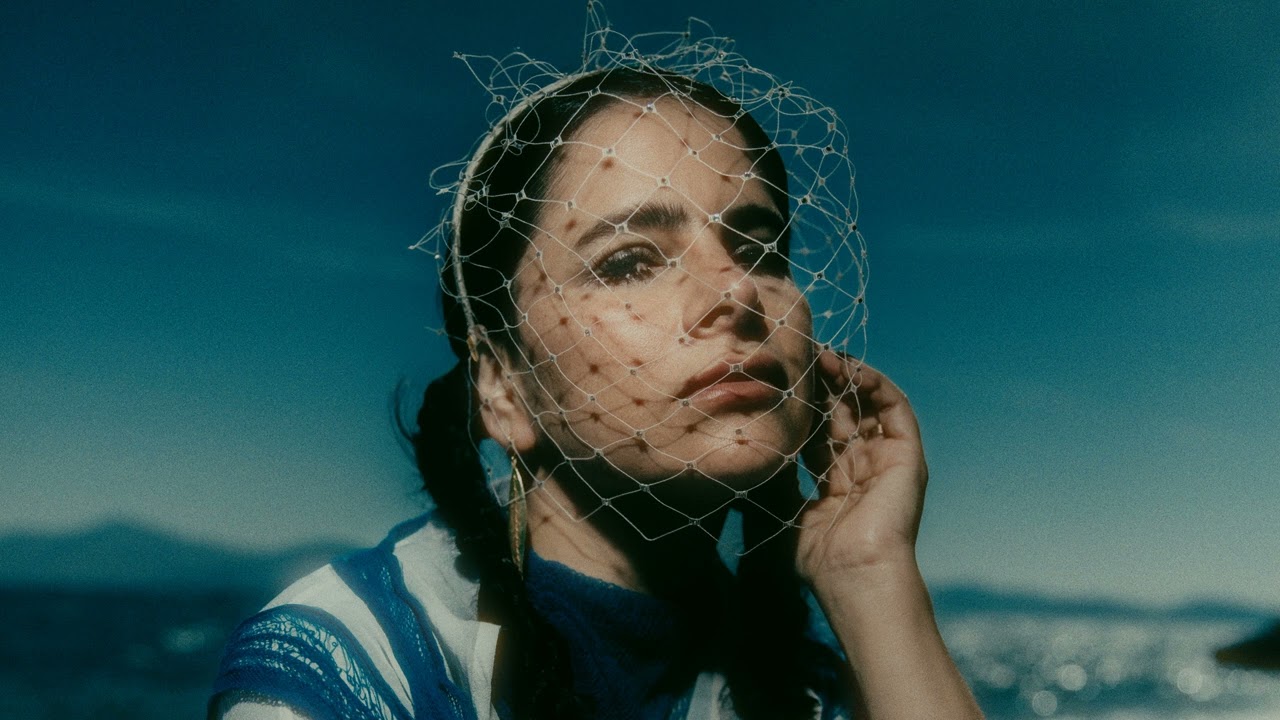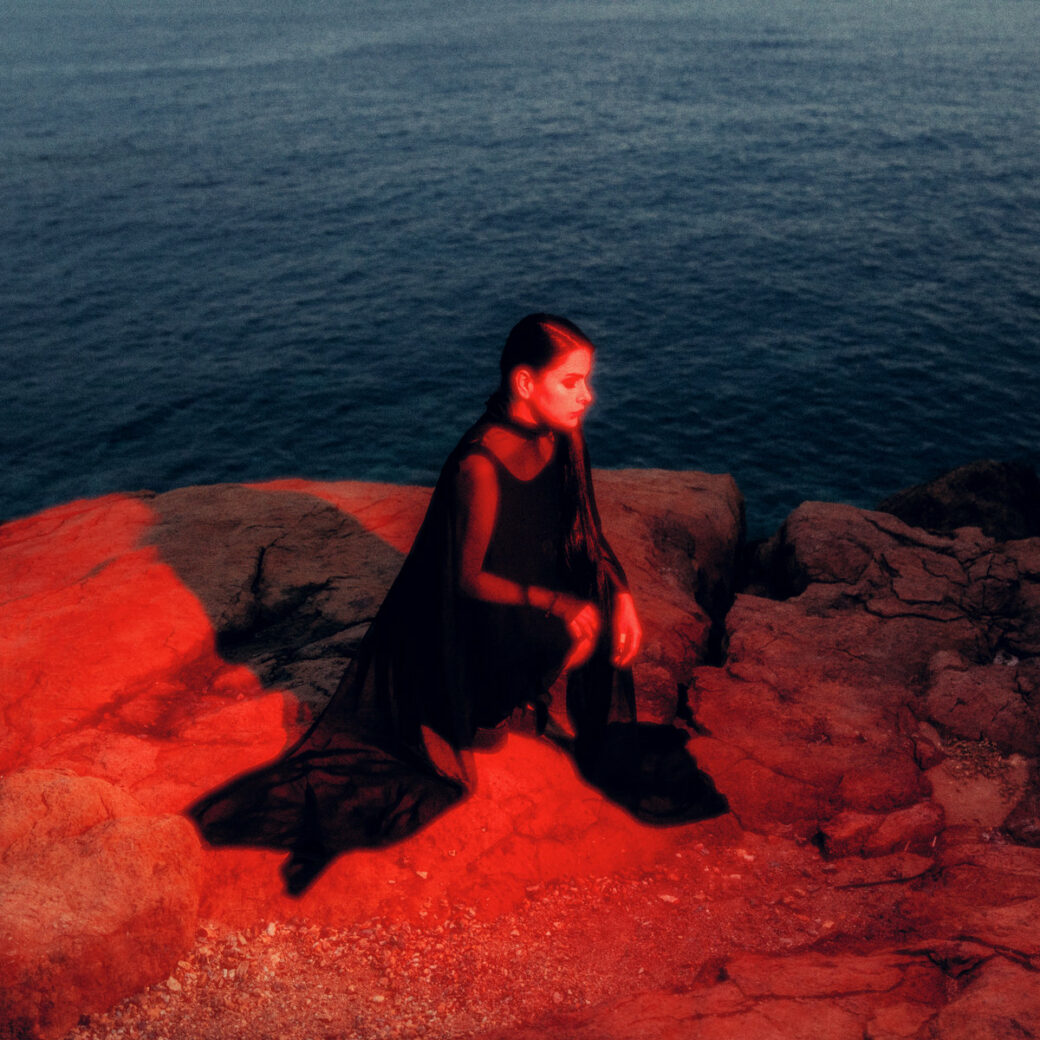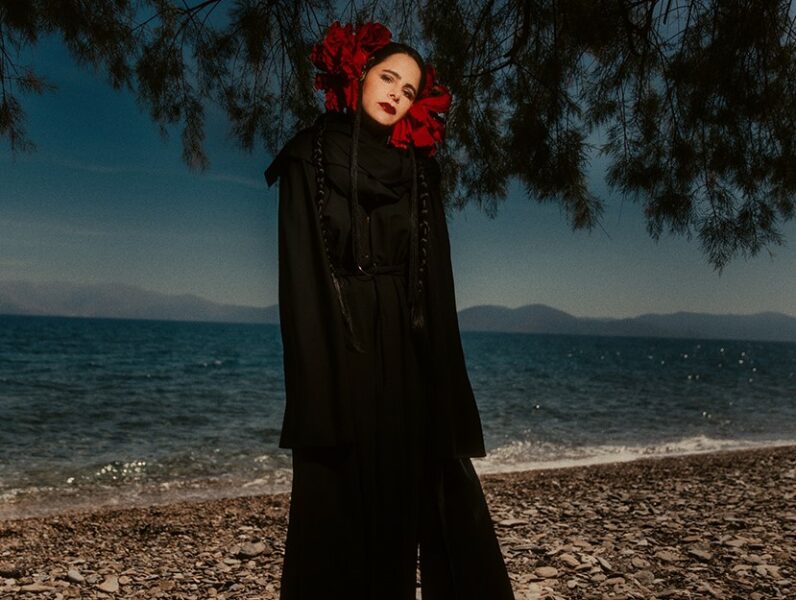Seeing the beauty within all the chaos in the world has become a challenge lately. As I’m writing these lines, war is raging across the globe from Ukraine to Palestine, Kurdistan, and Sudan, fascists and right-wing political parties are regaining power, and beyond that the climate catastrophe hangs like a dark cloud upon us all. These are tough times, still, there are moments of hope and Sofia Kourtesis knows a few things about those. Madres, her debut album, is the musical document of that – a tale about love, family, and quiet heroes.
One of those heroes is a rather inconspicuous neurosurgeon called Peter Vajkoczy who saved the life of Sofia Kourtesis‘s mother. The album is dedicated to those two people and the simple fact that there are still helping and caring people out there in this world. Some months after the passing of Sofia’s father, her mother was diagnosed with cancer and her health deteriorated rapidly. In between DJ-gigs and production work, Sofia went back and forth to Lima, talking to doctors who weren’t giving much hope for the survival of her beloved Madre. Hope came in the form of music … and the power of her community. Sofia had heard of Professor Vajkoczy and his skills but as one of the world’s best surgeons in that field, chances to get an appointment were extremely low. In a desperate move, she turned towards her fans on social media. She posted a snippet of music (which later became the title-track of the record) and promised to dedicate the song to Vajkoczy if somebody could put her in touch with him. The community carried that message all the way to the Berlin Charité, resulting in a quick appointment and a risky operation that went well and helped to extend the life of Sofia’s mother. It might sound like a miracle. But in times of crisis, people do help each other.
That was 2022 and that story shaped the sound of Madres, which is now finally seeing the light of day. It is one of summer’s last hot days when I cycle to my appointment with the Peruvian artist. I’m carried by the warm tenderness of the record, its gentle melodies, and a protagonist who is reaching a new phase in her artistic life. A few days before our interview, I had the pleasure of experiencing Sofia Kourtesis live at the Reeperbahn Festival. Having only seen her perform as a DJ before, I was surprised to see the amount of passion and dedication on stage. She brought the tender electronic songs to life and delivered their emotional messages recounting the path towards finding her artistic voice.
Your recent live performances show your transformation from a producer and DJ to something closer to a songwriter. What was the process like of finding your voice and telling stories in your own words?
I think the process was very important. I was living through processes of pain, grief, and all these things. In the album, it was crucial for me that it’s not the machines talking. In the past, I made music that has good vibes, that you can listen to in a club, or can dance to at a festival. This time I wanted to open up and I think there is nothing more beautiful than your own words and your own voice for that. I was like: Less machines, more me … to share my own story.
With a lot of traveling back to Peru to visit your mother and your DJ duties, how did you find space to work on these songs? Can you easily, I don’t know, sit in an airport and open Ableton and work on things?
Yeah, somehow it helps me a lot. I like to work in stressful situations with tight deadlines (laughs). When I make an album, I go and record the ideas at first. So there is a draft and the handwork after that, I can do from everywhere. The most important parts are the vocals, the main melodies, and the field recordings. I recorded them in one big session and then I structured them. Sometimes I like an idea, then I don’t like it and then I let it sleep for a little bit, and then I come back and finish it.
You’ve been quite vocal and transparent about the stories behind these songs, the health of your mother, why you left Lima, and what happened since. You just mentioned that you work well under stress, but how about emotional stress? Did you find yourself confronted with writer’s block or any dead ends?
Sometimes I go into a depression. But then with therapy, and by trying hard and pushing myself a little bit, good ideas come back. I just kept doing, I keep doing. I think everybody has writer’s block. When it occurs you have to be gentle with yourself and respect yourself. Then it will all come back.
During the process of working on these songs, do you show sketches to friends and colleagues or do you keep it for yourself until it’s finished?
Oh, I always show it to people. Dan from Caribou and Kieran Hebden (Four Tet) are good supporters. Their ideas are so important to me. If they like it, I’m happy. If not, then I’m not. But they are two people to whom I always love to send my things because they’re like my heroes. Dan is such a beautiful brother-like figure. He took me on tour, and he taught me so much about playing live. He showed me how to be very determined but also gentle and kind. I learned so much from him. He’s basically like my mentor.
Since this record is so closely connected to the idea of family and your mother especially, I was wondering how your roots shaped your musical persona. Did you put influences from your childhood, and teenage years into the album?
Definitely, there are still a lot of these things in there that influenced me as a kid. There are a lot of Afro-Peruvian voices that I have been listening to since I was a child. I try to cherish where I come from. Artists like Laurita Pacheco or folk group Los Uros del Titicaca. That’s super important to me. I guess it’s somehow in our brain, these beautiful melodies or like the sound. I embrace a lot of elements from home from classical Afro-Peruvian music and from classical folklore. I am proud to represent some Peruvian elements in my music.
How about your connection to club culture? Was there some sort of club scene when you grew up?
Oh no, you will not like our club scene. It’s not really a good one. Well, it has gotten better in Peru. It’s getting better now, but it’s like more like salsa, like very cheesy salsa, not even the nice salsa. And it’s only about having fun. Sometimes when I’m in the mood, I love it, but not in a club sense.

Activism Meets Artistry
Sofia Kourtesis has been living in two worlds for a while now. And that transition hasn’t always been that easy. Having been kicked out of school for kissing a girl, she was sent to the priest and finally to conversion therapy. Despite support from her family, she faced rejection in her community. To escape discrimination and homophobia, she moved to Berlin as a teenager. Combined with being raised by her activist parents (her father was a layer against corruption, her mother was fighting for women and LGBT rights in Lima district Magdalena del Mar) that resulted in an ongoing desire to express herself through art and to embrace her role as a political vocal person both in Germany and in Peru. Over the years, she became a persistent protester and campaigner for gender equality, the protection of queer people, and access to safe abortions in Peru. She also rooted for Cari Contreras, the first indiginous trans person that was voted into Peruvian congress.
On Estación Esperanza you’ll find a sample of field recordings taken in Peru at a protest against homophobia. Iconic Manu Chao features in the song. He was convinced by Sofia Kourtesis in the form of a long letter where she shared her thoughts on family, politics, and the vision of her art. You’ll find more moments like this throughout the record, sometimes more subtle and sometimes more obvious. The closing track El Carmen is driven by Afro-Peruvian percussion, inspired and partly crafted with local icons Los Hermanos Ballumbrosio. The song is meant to be a tribute to that community. Still, the electronic beats give the album a Berlin sound as well.
I compiled a playlist with tracks by you and artists that you cite as inspiration like Björk and DJ Koze. Any other highlights we should pay attention to?
Oh, definitely Barry Can’t Swim. You have to listen to him, you’ll love him. However, when I produce an electronic album, I try not to listen to electronic music because then I get lost. I listen to a lot of Latin American musicians and film music instead. I try not to be influenced so much by other artists I like. I love them, whether it’s Caribou or Four Tet. I can listen to them when the album is done but during the process, I really have to switch to other kinds of music. Because otherwise, I’m scared that I’m only trying to recreate these sounds.
The Meaning of Family
There’s a broader meaning to Madres that’s not just motherhood in a traditional sense. It is also about guiding lights, love and understanding in a communal way, and finding family and a safer space. Did you find that here in Berlin?
Yeah, of course. There is a huge friend support system here and a lot of people that I love that take me the way I am. Like my psychiatric psychologist. He’s one of my best support systems and thank god that he doesn’t leave me (laughs). So I guess I have my Madres community here.
What does family mean to you these days?
Oh, love, love, protection, and love again. The most beautiful thing.
Did your idea of family and chosen family change over the years?
It naturally did, yeah. For a long time, I took it for granted. Now I’m really cherishing it and I’m very privileged to live and nurture it. I have to take care of my family. Five years ago I didn’t take care of my family. I mean it’s the same with friendships or anything. Family, friendships, this is all the same. Taking care of the family. I love this.
Dancefloors and a good rave can create, in the best case, something like a temporary family. You’re together in this for three to eight hours. What do these moments give you personally?
I love the dance floor. More in Germany, here it makes me feel safe. In South America, sometimes it was very difficult for me. But here I feel safe, I feel at ease. I feel like it’s like a goodness moment. When you’re with the right friends and the right music, then it can be like a beautiful family time.
 Do you feel the same energy when you are in the DJ booth?
Do you feel the same energy when you are in the DJ booth?
When I’m in the booth, I am very concentrated. Sometimes I get lost in the moment and I feel the beautiful energy. But sometimes I’m very nervous. When I play a DJ set in Berlin, I feel more in my element and I can lose myself. I feel connected. But when I have to play at festivals, I feel more like the machine that has to bring some bangers in order to make people dance. It’s also tricky when you only have a two-hour slot or something. Sometimes even one and a half hours. At a huge festival, how am I supposed to build this up? EDM and confetti. Pyro techniques (laughs).
Were there any key moments in your DJ career where you thought: Oh that’s it! That’s why I want to do that?
I remember a night at Berghain last year that was amazing. I could go full nerdy there and could literally play any of my favorites, rarities, and hidden B-Sides. And the crowd loved it. I know it’s such a cliché but I love playing Panorama Bar. I’m not the biggest clubber in the world but I really enjoy spending my Sundays there.
It’s about feeling the love I guess. And that is still a strong force against the hate and despair we often sense in this world. What gives you hope that love will ultimately prevail?
It gives me hope that there are people out there who are trying really hard to work towards a better world in the ways they can. It can also be a local baker who gives bread to those who can’t afford it. It doesn’t be a big shiny hero but it’s the little people who do lots of good things. And I met a few of these people and they are truly wonderful.
Berlin neurosurgeon Peter Vajkoczy is one of those people. He saved your mother’s life. Is it true that you took him to Berghain?
That is a true story. I learned so much from him about his world and the things that he does to save other people’s lives that I wanted to show him my world as well. So I joked around with “Yeah, and then I take you to Berghain” and it turned out he was actually interested in that (laughs). So, he came with a group of colleagues and it was so funny. I was playing that night and they were my cheerleading team. It was like a funny comedy movie. It was a crazy situation but a few of those have happened to me lately and I guess that’s the point: It’s what music can do. It can make you feel better and bring people together.
I couldn’t agree more. Music can make a difference. It might not end the big conflicts of the world or change the mind of bad politicians but there’s something in there that connects people whether it’s on a dancefloor or in a more intimate setting. Madres became a stunning piece of warm and bewitching electronic music that is carried by all the positivity and hope that Sofia Kourtesis experienced in her life so far.
Madres is out now via Ninja Tune.
Sofia Kourtesis will take the record on tour soon. Stay up to date via her Instagram and Website. Feel invited to dive a bit deeper into her music and the artists who inspired her by streaming the playlist below.



